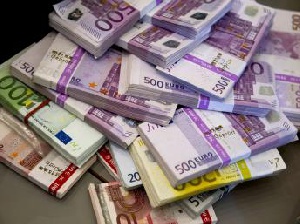The Finance Ministry will soon seek Parliament's approval to make a third appearance on the international debt market next year to raise at least US$1billion to finance capital projects in the 2014 budget.
The debt will be sold when the ministry sees the right window to enter the market, Deputy Minister of Finance Kweku Ricketts-Hagan told the B&FT. He said the ministry will also try to get leeway from Parliament to sell more debt than offered for sale if excess bids are received, adding though that international capital market rules limit the extent to which this can be done.
“The main idea is to finance infrastructure development - but if it makes sense to refinance some domestic debts because it is cheaper to borrow abroad at the time we sell the debt, we may do so,” he said.
Though no time-frame has been set for the issue, the ministry, according to Mr. Ricketts-Hagan, is seeking early authorisation from Parliament to enable it launch the debt anytime market conditions are favourable.
“Going to the capital market is about timing; and in our system where you have to get Cabinet and Parliament's approval, by the time you get the approval you could have lost the opportunity in terms of getting a good price - and that's part of the reason that we went to the market later than we should have done last time. What the Finance Minister wants to do is get the approval so that when we think the opportunity is right, we'll do so.”
Ghana's 2023 Eurobond sold in July came shortly after the US Federal Reserve had hinted of a possible deceleration in its bond-buying programme, known as quantitative easing, which raised interest rates on emerging market debts. The coupon rate of 7.875 percent on the bond was well above issues by sub-Saharan African peers Nigeria, Rwanda and Zambia which had sold debts in the 12 months to Ghana's issue.
The prospect of quantitative easing tapering-off has not disappeared, and the ministry will be mindful of this as it considers the right time to enter the market, Mr. Ricketts-Hagan said.
Plans for the bond also come in the wake of the lowering of the country's sovereign rating by Fitch in October. The agency cut the rating from B+ to B, which is five levels below investment grade - citing slow progress toward trimming the large 2012 budget deficit of 11.8 percent of GDP.
An investment grade issue has a rating of BBB- or better and is an important rating factor as many investors could be restricted by regulation or private contracts to invest in investment grade assets. On Monday, Fitch stressed its B rating for Ghana in a statement that doubted the credibility of fiscal targets outlined in the 2014 budget by the Finance Minister.
“We do not think [the budget] will effectively address the deterioration in government finances over the past two years that has substantially eroded Ghana's creditworthiness,” the statement said, warning that next year's deficit projection of 8.5 percent of GDP could be breached again.
Finance Minister Seth Terkper is however confident the sale will be successful - telling B&FT that unlike Fitch, the three other agencies that rate Ghana have not changed their assessment. Moody's rates the country four levels below investment grade at Bl, while both the Economist Intelligence Unit and Standard & Poor's rate the country B.
Business News of Wednesday, 27 November 2013
Source: B&FT













